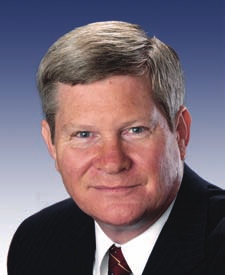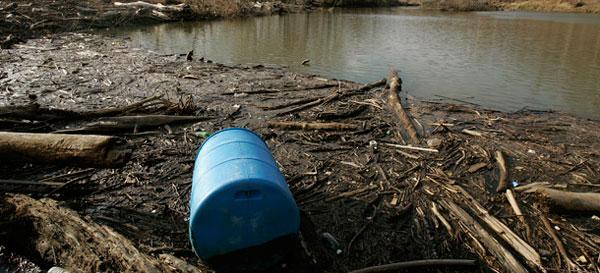
A plastic 55-gallon barrell is seen amongst piles of driftwood and mud along the Potomac River in Cropley, MD. The main culprits for the river’s deteriorating health are agricultural runoff and suburban sprawl due to a booming local population. This CAP post looks at some useful responses.
Global warming is on the national and global agenda, but we could very well be on the brink of a global water crisis. Water scarcity has received some attention from the media, but water pollution problems remain. And not just in China: Washington, D.C. residents are currently banned from swimming in the Potomac, the river that cradles the nation’s capital and feeds into the Chesapeake Bay.
The main culprit for the river’s deteriorating health is suburban sprawl due to a booming local population. More sprawl means less forest and more concrete, asphalt, and turf grass. These “impervious” surfaces, which today cover 25 percent of the Potomac watershed, disrupt the water cycle: rather than being filtered by soil and plant roots, rainwater rushes into storm drains. The runoff, loaded with road grease, trash, and silt, empties out into the Potomac and its tributaries. On the way there, it warms, accelerates, and often mingles with raw sewage spilling over from the area’s combined rainwater sewer systems.
What does this hot, fast, dirty runoff do to the river? Impacts range from unsafe quantities of toxins and increased bacterial concentrations to eroded streams, deteriorating ecosystems, and fish kills from dark, oxygen-starved water.
But it’s not just the suburbs that are to blame. Agricultural byproducts such as fertilizer and chicken manure are also finding their way into the Potomac. The resulting cocktail of nutrients, hormones, and fecal bacteria feeds algae blooms and dead zones downstream in the Chesapeake Bay. And although nutrient levels have been declining for the past three decades, they remain far above their mandated caps.
If the pollution wasn’t bad enough, Nicholas Kristof from the New York Times recently profiled the “intersex” fish that now grace the Potomac. According to a recent survey, over 80 percent of male smallmouth bass in the river now have eggs growing in their testes. The precise cause of this deformity remains unknown, but scientists suspect endocrine disruptors from chicken (remember that manure) or human hormones (which result from birth-control pills and flow right through waste treatment plants). In humans, endocrine disruptors have been linked to early puberty, obesity, diabetes, and both breast and prostate cancer. Keep in mind that these hermaphrodite fish are swimming around in D.C.’s tap water.
What is to be done? As with many environmental problems the solution is smart policy. Local governments should protect existing forests and replant strategic areas along the watershed. They should also mandate the use of low-impact development practices. LID seeks to minimize the suburb’s footprint on rivers by preserving a site’s natural offset-absorbing features — such as existing vegetation and drainage courses — and treating the remaining stormwater onsite using green roofs, porous pavements, and highway medians full of water-absorbing plants.
To incentivize this shift, the EPA should update the federal Clear Water Act by including stormwater permits with numeric limits, which are lacking in the current ineffective regulations that govern new development. These new rules will in turn require local governments to build the capacity necessary to review community stormwater plans and enforce runoff limits.
Research on the intersex fish and on endocrine disruptors is ongoing. The EPA is currently moving to test the compounds. It should accelerate this testing and regulate if necessary.
Remember: Rivers throughout the country are being polluted by agriculture and suburbanization. But change rarely happens without individuals pressuring the political process. Improving our nation’s health and environment is not a spectator sport, so call on your representatives to act on this issue and inquire about greening your roof.




